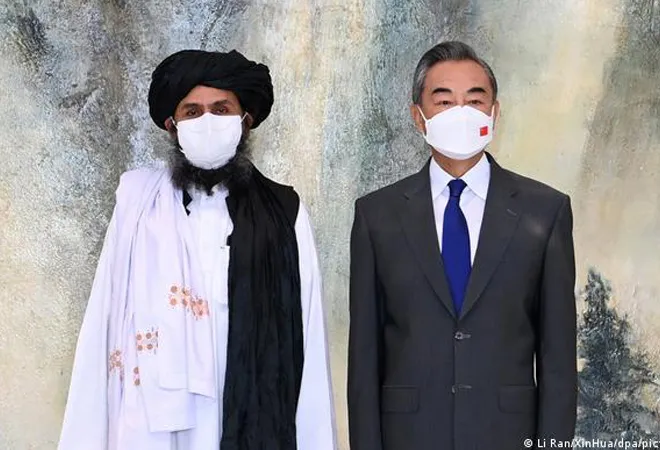China wants the world to give the Afghan Taliban the space that it needs to settle down. The announcement of a $31-million emergency aid package to the interim Afghan government, a day after the formation of a caretaker cabinet, is tantamount to de facto endorsement of the Taliban as Afghanistan’s new rulers. China’s backing for the Taliban is meant to ensure smooth sailing for its new comrades in Kabul.
China prefers to do business with anyone who is in power, and a Taliban-dominated Afghanistan is no exception. In line with this approach, China’s foreign minister, Wang Yi, recently asked the United States (US) secretary of state, Antony Blinken, to engage the international community to “positively guide” the Taliban, and continue to provide economic and humanitarian aid so that the new regime could run governmental functions normally. Cautioning that hasty withdrawal could allow terrorist groups to “come back stronger”, Wang advised the US to “take concrete action to help Afghanistan fight terrorism and stop violence, rather than playing double standards or fighting terrorism selectively”.
China prefers to do business with anyone who is in power, and a Taliban-dominated Afghanistan is no exception
The dominant narrative has suggested that the American pullout will allow China to extract Afghanistan’s mineral resources and enter into a mutually beneficial partnership with the Taliban to incorporate Afghanistan into its Belt and Road Initiative (BRI). The Taliban is also effusive in its praise of Beijing, terming China as Afghanistan “most important partner” in national reconstruction efforts. While both parties have a vested interest in letting this view dominate their public communication, the fact remains that the region benefited from the security provided by the American military’s presence, which is no longer available.
Conflict resolution and political problem-solving in other countries are not traits that Chinese diplomats excel at. It remains to be seen how China walks this tightrope in Afghanistan, which remains a fractured crucible of contradictory ethnic and political interests. The Taliban may have successfully driven the Americans out, but the Pashtun-dominated outfit still does not represent the entire Afghan population.
Lacking in basic professional skills needed to fulfill its promises regarding counter-terrorism operations, the Taliban is going to face exasperatingly complex challenges in managing police functions, safeguarding Afghanistan’s borders, protecting citizens and fighting the Islamic State-Khorasan (IS-K). Instability in Afghanistan, underlying tensions among its various political groups, and the presence of al-Qaeda and IS-K all present China with a strategic headache that will not disappear as long as the Taliban is not empowered and pressured to act on its promises.
The dominant narrative has suggested that the American pullout will allow China to extract Afghanistan’s mineral resources and enter into a mutually beneficial partnership with the Taliban to incorporate Afghanistan into its Belt and Road Initiative (BRI).
China does want to reap economic benefits of a stable Afghanistan but it has to first ensure that there is no spillover of security threats from Afghanistan into its restive Xinjiang province. Past experience validates China’s concerns. The Taliban has so far dodged uncomfortable questions related to China’s treatment of Uyghur Muslims. But it won’t be able to avoid addressing this issue as Beijing will soon press for enhanced counter-terrorism coordination.
An early indication of Chinese intent was visible when Wang, during a recent meeting of foreign ministers from China, Pakistan, Iran, Tajikistan, Uzbekistan and Turkmenistan, unambiguously asked the Taliban to take concrete actions to eliminate terrorist groups, while strengthening intelligence-sharing and border control with neighbours. Thus, the China-Taliban bonhomie may not last if the Taliban government is found dilly dallying on a crackdown against the Eastern Turkistan Islamic Movement (ETIM).
The Chinese State media seem delighted over America’s momentous defeat in Afghanistan. While taking potshots at Washington’s perceived arrogance in assuming it could transform the war-torn country politically, there is a palpable sense of unease in China’s official circles. There is no appetite in China to wade into the swamp where the US miserably failed. China remains reluctant to become overly involved in a country which is known as the graveyard of empires.
The China-Taliban bonhomie may not last if the Taliban government is found dilly dallying on a crackdown against the Eastern Turkistan Islamic Movement (ETIM).
Irrespective of opportunities such as economic advantages for the BRI and cementing Chinese regional dominance, it is China’s defensive interest that remains at the core of its Afghan strategy. Irrespective of who rules Afghanistan, Beijing wants to ensure that there is no reduction whatsoever in Kabul’s ability and intent to fight against terrorism that is directed against China.
China has made very little headway on its current investments in Afghanistan and seems cagey of getting bogged down in an unpredictable geopolitical environment. Beijing had earlier tried to position the Shanghai Cooperation Organization (SCO) to reconcile divergent regional interests, but seems to have lost its enthusiasm as the SCO proved too unwieldy for the tricky task.
China’s enhanced diplomatic efforts primarily focus on securing Xinjiang against any jihadist influence, and Beijing does not seem to have any intention to involve itself in the treacherous territory of Afghanistan based on miscalculations of power and interests. China’s mostly unsolicited advice to the US only underscores its cautious attitude as Beijing does not want Afghanistan to once again become a safe haven for militant groups.
This commentary originally appeared in Hindustan Times.
The views expressed above belong to the author(s). ORF research and analyses now available on Telegram! Click here to access our curated content — blogs, longforms and interviews.




 PREV
PREV



